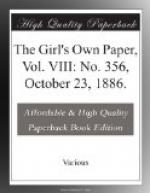“Mother is out; there is no one at home but me,” said Jack, sharply.
“Oh, is she? Well, I’ll sit and rest a bit till she comes in. Who have you got there in that cradle?”
“Charlie, my new brother,” said Jack.
“And where is the fairies’ baby? Ah! you see, I know all about it. I know everything; there is no keeping secrets from me. That is the shawl it was brought in, isn’t it, now?” said Dame Hursey, rising and examining minutely the Indian shawl in which the baron had wrapped his daughter, and which was lying on a chair.
Jack, more convinced than ever that Dame Hursey was a witch, thought perhaps she might be able to tell him where the fairies had brought the baby from if he were civil to her, so he answered all her questions and described minutely all the baby’s belongings.
“Ah! well, it is the Pharisees you have to thank for bringing her here. Mind you all take care of her, and one of these fine days she’ll turn into a beautiful princess and make you all very rich; but if you talk much about her the fairies will be angry and take her away. You tell your mother I said so; I can’t wait any longer.”
And Dame Hursey, who had been prying about the kitchen to see if she could find any other belongings of this mysterious baby, took her departure, much to Jack’s joy.
Shortly after she left Mrs. Shelley came home, and Jack was so full of Dame Hursey’s visit and her account of the fairies’ child that he forgot to ask the result of his mother’s interview with the rector, while Mrs. Shelley, on the other hand, was not at all pleased to find Dame Hursey had been prying about her cottage in her absence, and congratulated herself on not having left any of the baby’s little garments about, for she might never have found them again if she had.
The next day the rector called and had a long talk with the shepherd and his wife about the baby, though he could throw but little light upon it, except, of course, to utterly discredit the ridiculous notion that the fairies had brought it. That it belonged to rich people was clear from its clothes; and to foreigners, from the coronet, which was certainly not English. More the rector could not say, except that its parents evidently wanted to get rid of it, and had connived at placing it on the shepherd’s doorstep.
As to keeping it, that was a point entirely for the shepherd and his wife to decide. If they chose to send it to the workhouse, no one could blame them for doing so. He doubted exceedingly anyone ever claiming it, but he advised Mrs. Shelley to lock up all its clothes and things in case of their being needed for identification at any future period. He also counselled them, if they thought of keeping the child, to weigh the matter well before they decided, as it would be cruel kindness to take it in for a time and then tire of it and send it to the union.
But John Shelley was not a man to do this, as his wife well knew. If he decided to keep the child he would do his duty by it, and go to the workhouse himself before he suffered that to do so. All that day John was very thoughtful, but when he came in to supper that night he told Mrs. Shelley he had made up his mind, and they would keep the baby and bring it up as their own daughter. Here, however, Mrs. Shelley raised an objection.




